#Menopause Journey
Text
#menopause#women#womens health#health#menopause journey#true story#stories#women's stories#Medium writers#Medium Stories
0 notes
Text
Have I Found a Surprisingly Simple Way to Get a Second Chance in Midlife?
I thought I would take some time to fill you in on my HRT journey, seeing as I have dragged you all through the misery of getting it with me!
It’s been six weeks since I started using Oestrogel and I have now been on two rounds of Utrogestan (progesterone tablets), which I take before bed from the 15th through to the 26th of the month. I have definitely noticed an improvement. I still get the…
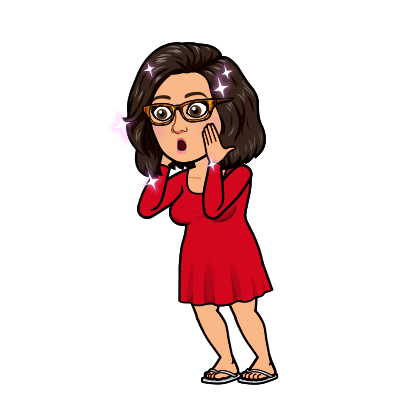
View On WordPress
#Daily Routine#Embracing Change#Finding Balance#health and wellness#Hormones#HRT#Life Updates#Lifestyle#menopause#Menopause Community#Menopause Journey#Midlife#Midlife Adventures#new beginnings#Perimenopause#Perimenopause Experience#Personal Growth#Personal Reflection#positive mindset#Relationships#self care#Self Discovery#self improvement#self reflection#Womens Health
1 note
·
View note
Text
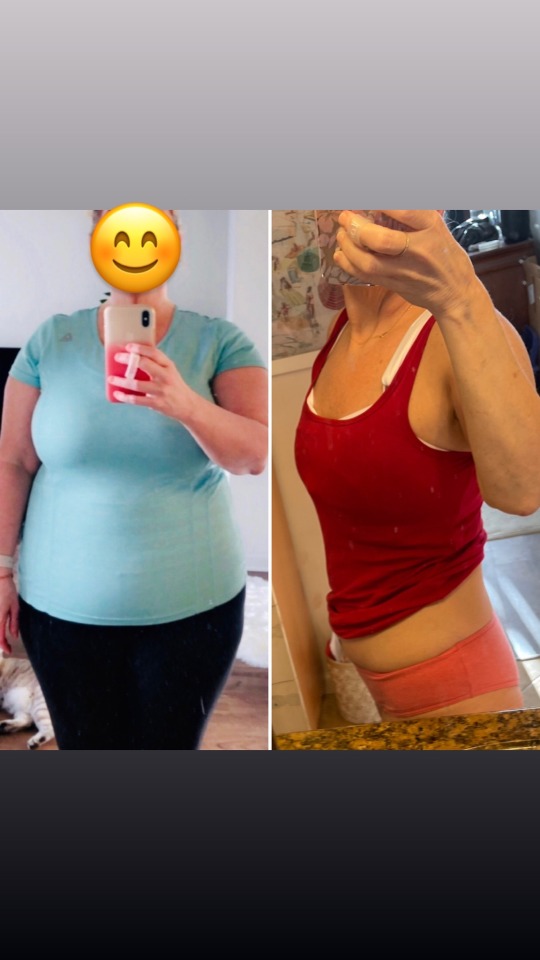
Hi Bunnies
Here are the first pictures of me after my breast reduction and lift 10 days ago. I still have a lot of swelling in my abdomen and bust area. Lots of bruising. But I’m off narcotics and I’m sleeping through the night. Try sleeping flat of your back all night. Misery!
No running or lifting for 4 weeks. But I can start walking and light upper body exercises this week.
Comparison photo: May 2020 versus January 2023.
201 lbs versus ~138 lbs.
Life doesn’t stop at menopause. I will trust my journey in 2023.
💋
#personal#selfsun#selfie#keto#exercise over 50#weight loss after 50#weight loss#menopause sucks#fitness#low carb#running#breast reduction surgery#weight loss after menopause#weight loss before and after#don’t steal my pictures#may delete later#january 2023#trust my journey
68 notes
·
View notes
Text
Let’s have a REAL conversation about aging and the changes our bodies go through.
If you’ve followed me awhile, you know I was 60 lbs overweight in my 20s. Got sick of the discomfort and yo-yo dieting, took responsibility, learned my mind and body, and became obsessed with nutrition. My nutrition and fitness has been dialed in for years and I know my body. Yet, despite doing everything right, I gained 10 lbs this last year. Perimenopause blindsided me.
I feel softer than I’ve been used to, hormones are going crazy, mood and body temp all over the place…. It’s humbling, to say the least. (Ladies, raise your hand if you feel me!? 🙋🏻♀️) Instead of fighting the natural process (which would only increase stress & work against hormone health), I’m staying curious and relearning me in this new phase. I’m determined to go through this new phase the best I can!
There is a RIGHT way to eat and exercise based on your cycle, or the phase of life you’re in. When I learned this new science, I realized I was pushing my body past the point of hormone balance. Fitness is such a mental release for me, but doing high-interval training during my luteal phase or in perimenopause was turning on fat storage and working against my hormone balance. The way we eat and move can either hurt or help hormone health. Learning and implementing this can make all the difference. More to come on this….
#FitOver40 #PerimenopauseFitness #HealthyIn40s #FitnessJourney
#hormonehealth #StrongWomen
#hormonebalance #WomenWhoLift
#hormoneimbalance #WellnessOver40 #cyclesyncing #Wellness #EmpoweredWomen #FitnessMotivation #PerimenopauseJourney #HealthAndFitness #FitnessInspiration #WomenFitness #perimenopause #FitnessForLife
#fitness#health#healthy#healthy living#healthy lifestyle#goals#Weight loss#weight loss journey#health journey#women’s health#hormones#hormone health#perimenopause#menopause
2 notes
·
View notes
Text

Today’s daily Tarot reading was a bit jarring with two major arcana cards. Also first time I used my Jungian deck instead of my beloved Shadowscapes deck for a simple daily. The question combo was how will these pervasive migraines and heath transition play out this week?” For background I’m switching from one migraine medicine to another to help with my burgeoning crone phase; it’s not going smoothly unfortunately. So the Death card (13) and the Fool card (0) respectively suggests transition is indeed carrying the day; the Fools journey has certainly piqued my curiosity. I’m very much an amateur reader but I don’t say beginner only because I grew up in a world where my Grand-mère, Aunties and Father all regularly taught about readings, tea leaves, signs, plant medicines and messages from our ancestors. I simply didn’t have any rigour to my learning until relatively recently.
And also I finally managed to find TV time this week and watch Good Omens and from perspective, the beauty of the juxtaposition of opposites, the amount of energy in that space is exactly what this world needs, so why not a microcosm of that in myself too?!
2 notes
·
View notes
Text
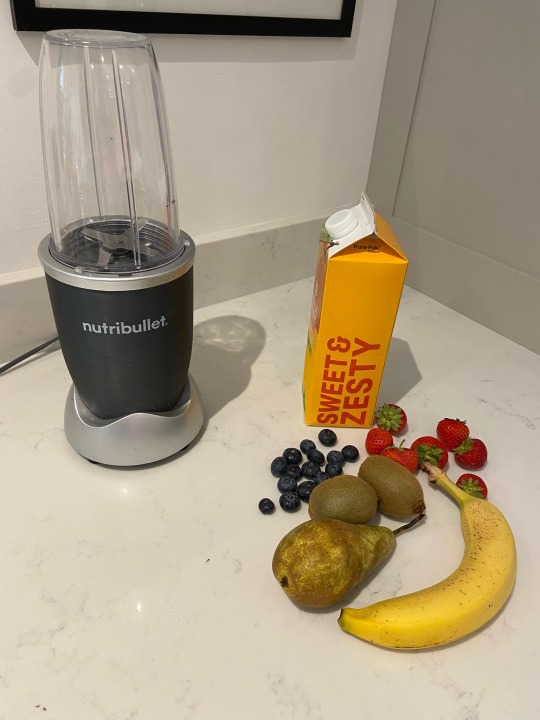
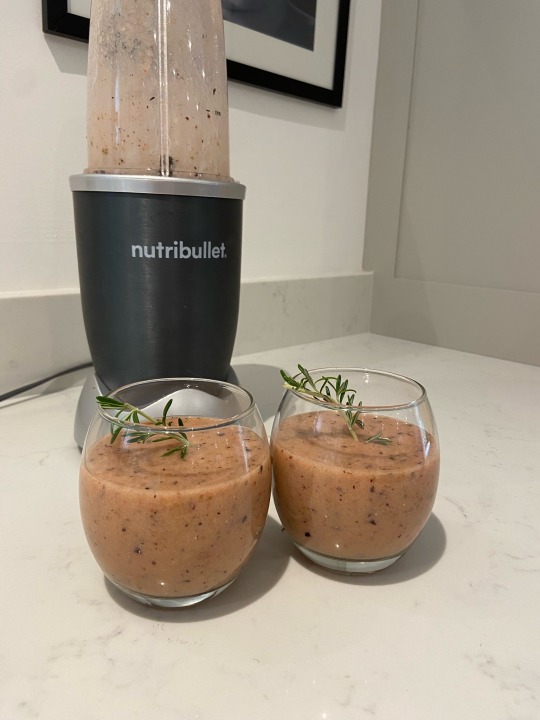
As it’s a Monday and I wouldn’t be reaching for an alcoholic drink before this experience, I’ve blitzed up a healthy smoothie to start the week off.
Contents - one banana, two kiwis, some strawberries, some blueberries, a pear, a spoon of runny honey and some water.
Served with ice and a sprig of thyme.
#clean and sober#nonalcoholic#menopause#sober#sober journey#sobercommunity#soberissexy#soberlife#soberliving#teetotal#smoothie#healthy#nutribullet
2 notes
·
View notes
Text
So, Dr has informed me that hormonally, I’m menopausal.
I’m currently 49 years old, so I’ve been expecting this for a few years. I’ve had a Mirena for 3.5 years, so judging by menstruation isn’t an appropriate gauge for me.
Here, I am going to share my Journey. The funny, exasperating, unexpected, journey “markers”, and what I find fascinating.
0 notes
Note
I apologize if you’ve been asked this question before and I missed it in the craziness that is Tumblr, but can I ask what type of foundation you use? I don’t have MCAS, just rosacea-slash-really sensitive skin, which I used to have a fairly good handle on. Unfortunately, going through menopause dialed everything up to eleven somehow. So now I’m having to reevaluate every single skin care product that I’ve ever used.
Ooft, solidarity, the struggle is real.
So, the foundations I use are the pressed mineral powder from Gabrielle Cosmetics/Zuzu Luxe* (same parent company), which can be applied either dry or wet. I've also got their oil-free liquid foundation, which I think gives a bit better coverage during the winter.
I will say they are not overly good at covering up rosacea or red skin (I have the "MCAS flush" on the sides of my face and high on my cheeks and sometimes on my nose that I can't hide, so I make it look like aggressive blusher, lol. Assigned e-girl by my immune shit)
I'm actually about to patch-test a red-correction liquid foundation from Daniel Sandler*, which I've heard from a few other MCAS people has been helpful at covering up the MCAS flush and not caused too many reactions for those of us who have extra sensitive skin. I use their liquid watercolor blush without issue as well, so here's hoping. I can post an update if anyone is interested when I've done testing it.
I was also recently recommended a Korean skincare brand called Dr. Jart+* by someone else with rosacea, which looks interesting, but unfortunately, they've all got some level of sunscreen in them, and the last time I had serious anaphylaxis was from an absorbent sunscreen so I'm not supposed to use them. RIP to my skin, I guess.
Anyway, that's what I use. Good luck in your skincare journey.
*not sponsored or affiliated, just sharing what I use/have been recommended by other folks with super sensitive skin.
1K notes
·
View notes
Text
Top Benefits of Meticore for Weight loss
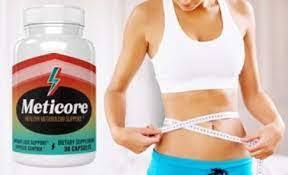
Losing weight is not always easy because of the numerous factors that affect an individual’s ability to lose weight and maintain it in the long run.
As much as healthy eating and exercising are vital in your weight loss journey, including a supplement to your daily routine can make it much easier to achieve your weight loss objectives.
There are numerous fat burner products in the market in the modern-day. However, not all of them live up to what is advertised and your expectations.
Some fat burner products do not have an effect on fat and weight loss, while some have compounds that cause adverse health effects.
Meticore
is a supplement that promotes a healthy metabolism with natural fat burning and weight loss.
It is formulated with superfoods that increase the rate of metabolism in your body by raising the core body temperature.
When you take this supplement
daily, you can easily achieve your weight loss goals.
To achieve the best results, use Meticore
combined with activities that induce fat loss, such as routine exercise.
The product is worth considering because of its numerous benefits, including;
100 percent natural
Vegetarian friendly
Contains no additives
It has no artificial stimulants
No tolerance forming tendencies
Click here to know more Meticore
Read more from Medium.com
Read more from tumblr
Read more from quora
#weight loss diet#natural weight loss foods#fitnessburnfat#weight loss#weight loss journey#diet#weightlifting#healthy diet#diet plan#ketodiet#i wanna lose weight#i wanna be weightless#need to lose more weight#best way to lose weight#healthier#i need to lose so much weight#menopause#meticore#lose weight
0 notes
Text
0 notes
Text
Nausea and New Beginnings: My HRT Journey Finally Starts
Last week, I left you at the point where I had managed to bag a telephone appointment that very morning to talk to my doctor. She called me just after 10 a.m., apologising for the blood pressure machine not working properly. She said she didn’t want to put me on blood pressure medication yet but wanted to keep an eye on it. I could feel the lump in my throat growing as I told her I was confident…

View On WordPress
#Body and Mind#Health Journey#Healthand Wellness#Hormone Balance#Hormone Replacement Therapy#HRT#HRT Experience#HRT Journey#Life Changes#Medication#menopause#Menopause Awareness Month#Menopause Journey#mental health#Mental Wellness#Midlife#NHS#Pause to Talk#Perimenopause#Personal Health#self care#Self Love#Wellness#Womens Health
0 notes
Text
My guide to “How to accomplish almost nothing in one morning”
Never ceases to amaze me how I can get so little done over a vast amount of time.
I usually blame the pain and the drugs, but I’m starting to think that the following 👇👇 is just what “me” as an adult looks like.
Read on if you have 2 mins to spare and you’ve not shook your head in disbelief enough today.
This happened yesterday!!!!
So, the plan was 👇👇
Get upTake medsDrink coffee whilst…
View On WordPress
#anxiety#art#arthritis#artist#artofdistraction#autistic#CFS#chronic illness#Chronic Pain#depression#diabetes#family#fibromyalgia#insomnia#life#menopause#mental health#mental health awareness#my journey#partner#stenosis#thyroid disease#women
0 notes
Text
Does anyone have any advise for a podcast (or anything) about menopause? Something science based and not just advertisements for books or clothes. It’d be great if it wasn’t “woman” pushing, but I can deal with that. (No “divine woman” nonsense, but can put up with them using “woman” instead of “person.”)
#101 ways to feel not like a woman#listen to people talk about Being A Woman and Changes#if you're going to interview people I don't really care about their past - I want to know what they learned#give me information about what is going on!#they seem about to touch on it but it ends up being an interview about their journey about whatever menopause related thing#rather than the thing
0 notes
Text
Woman on Pause
Ain’t this about a biiiiitch. Fuck me. As if life wasn’t a mixed bag of ups and downs enough. When you’re at the age where a missed period doesn’t mean you’re pregnant. And you find yourself wishing something you never had before. That you WERE pregnant. Cuz anything would be better than this.
Fucking menopause. Jesus Christ.
Where shall one begin.
Seriously.
I never thought it would be this…
View On WordPress
0 notes
Text
On Power, and on Powering Through, and Why They’re Really Not the Same
I don’t pay much attention to personal attacks in reviews. It comes as the flipside of success; an attempt by the critic to puncture what they see as too much success. But I still remember one review, just after the film of Chocolat, when two of my novels happened to be in the Top 5 at the same time, in which a (male) newspaper critic referred to me dismissively as a premenopausal woman writer. I was a little taken aback. Clearly, it was meant to disparage, but I was only 35, ten years away from the perimenopause. What exactly did he mean? It wasn’t a comment about the book (which I doubt he had even read). The obvious misogyny aside, it seemed to express resentment, not of my books, but of me, myself, my right to take up space in his world. That word – premenopausal – was at the same time a comment on my age, my looks, my value, and a strong suggestion that someone like me shouldn’t be this successful, shouldn’t be writing bestsellers, shouldn’t be so – visible.
I don’t recall the name of the man, or the paper for which he was writing. He was far from being the only journalist who felt I didn’t deserve success. I shrugged off the unpleasant comment, but he’d meant it to hurt, and it did. I still wonder why he – and his editor - thought that was appropriate. I also wonder why, 20 years on, women are still dealing with this kind of thing. It’s still not enough for a woman to be successful in her chosen field. Whatever her achievements, you can be pretty sure that at some point, some man in his 50s or 60s – maybe an Oxbridge graduate, author of an unpublished novel or two - will offer his opinion on her desirability, either in the national Press, or most likely nowadays, by means of social media. The subtext is clear: women who don’t conform to societal values of what a woman should be are asking for this kind of treatment; especially those who dare to achieve more than their detractors.
10 years after that nasty review, I finally began the journey into perimenopause. No-one told me it was happening. No-one in the media was talking about it at the time. Even my doctor never thought to mention that my symptoms – the insomnia, headaches, mood swings, anxiety, depression, sleep paralysis, hair loss, brown patches on my skin – might have a single origin. I began to feel I was losing my mind: as if I were starting to disappear. I started to doubt my own senses. I blamed it all on the stress from my job. My mother had powered through menopause – or so she led me to believe – and made no secret of her contempt for modern women who complained, or treated the symptoms as anything more than a minor inconvenience.
And so I did the same. I powered through; and when at last I began to experience the classic symptoms of menopause - irregular bleeding, hot flushes, exhaustion, night sweats so bad that I would awake in sheets that were wringing wet – it did not occur to me to seek help. After over a year of this, I finally went to my doctor, who took a few tests, cheerfully announced I was menopausal, and when I inquired after HRT, advised me to power through – that phrase again - and let Mother Nature take her course. The internet was slightly more helpful. I took up running, lost weight, cut down on alcohol, downed supplements and sleeping pills and vitamin D, and felt a little better. Then, breast cancer came to call, and by the time my treatment was done, the symptoms had more or less disappeared, or at least had been superseded by the symptoms of chemo. I congratulated myself at having powered through cancer as well as surviving menopause.
But two years later, I feel old. I look that way, too. I’ve aged ten years. Some of that’s the cancer, of course. I was quite open about my treatment when I was powering through it – partly in order to pre-empt any questions about my hair loss or any of the all-too visible effects of three courses of chemo. Not that it stopped the comments, though. Even at my lowest ebb, a sector of social media made it clear that my only concern should be to look young and feminine to anonymous men on Twitter.
Right now, I don’t feel either. My hair has gone grey and very thin. My skin, too, seems thinner; both physically and mentally. At a recent publishing event, several acquaintances failed to recognize me; others just looked through me as if I had become invisible. Invisibility would be a relief; I find myself dressing for camouflage. I tend to wear baggy black outfits. I got my OBE last week. Photographs in the Press show me talking to Prince William. I’m wearing a boxy black trouser suit, flat shoes and a red fedora. I think I look nice. Not glamorous, but comfortable; quirky; unpretentious.
On a thread of largely supportive messages, one Twitter user pops up to say: Jesus, who’d accept an honour looking like that middle-aged disaster? @Joannechocolat thought she’d make an impact? She needs a stylist. If you look in the dictionary for the definition of “dowdy”, it features this photo.
It’s not the same man who belittled me over 20 years ago. But the sentiment hasn’t changed. Regardless of your achievements, as a woman, you’ll always be judged on your age and fuckability. I ought to be used to this by now. But somehow, that comment got to me. Going through menopause isn’t just a series of physical symptoms. It’s how other people make you feel; old, unattractive, and strangely ashamed.
I think of the Glass Delusion, a mental disorder common between the 14th and 17th centuries, characterized by the belief that the sufferer was made of glass. King Charles VI of France famously suffered from this delusion, and so did Princess Alexandra Amélie, daughter of Ludwig 1st of Bavaria. The condition affected mostly high-profile individuals; writers, royals, intellectuals. The physician to Philip II of Spain writes of an unnamed royal who believed he was a glass vase, which made him terribly fragile, and able to disappear at will. It seems to have been a reaction to feelings of social anxiety, fear of change and the unknown, a feeling both of vulnerability and invisibility.
I can relate. Since the menopause, I’ve felt increasingly broken. I don’t believe I’m a glass vase, and yet I know what it feels like to want to be wrapped in a protective duvet all day. I’ve started buying cushions. I feel both transparent, and under the lens, as if the light might consume me. On social media, I’ve learnt to block the people who make mean comments. To make myself invisible. To hide myself in plain sight. I power through, but sometimes I think: why do women power through? And who told them that powering through meant suffering in silence?
Fortunately, some things have changed since I went through the menopause. Over the past few years, we’ve seen more people talking about their experiences. Menopause is likely to affect half the population. We should be talking about it. If men experienced half these symptoms, you bet they’d be discussing it. Because power isn’t silence. You’d think that, as writer, I would have worked that out sooner. Words are power. Sharing is strength. Communication breaks down barriers. And sometimes, power means speaking up for those less able to speak for themselves.
I look at myself in the mirror. I see my mother’s mouth; my father’s eyes. I see the woman I used to be; the woman I will one day become. I see the woman my husband loves, a woman he still finds attractive. A woman with a grown-up child who makes her proud every single day. A menopausal woman. A cancer survivor. A woman who writes books that make other people sit up and think. A woman who doesn’t need the approval of some man she’s never met to be happy. She can be happy now. I can. And finally, I understand. Powering through isn’t about learning to be invisible. It isn’t about acceptance, or shame, or letting Nature take its course, or lying about feeling broken. It’s looking beyond your reflection. It’s seeing yourself, not through the lens of other people’s expectations, but as yourself. The sum of everything you’ve been; of everyone who loves you. Of claiming your right to be more than glass, or your reflection in it. The right to be valued. The right to shine, regardless of age or reproductive status. Men seldom question their own right to these things. But women have to fight for them. That’s why it’s so exhausting.
This morning, instead of putting on my usual baggy black sweatshirt, I chose a bright yellow pullover. I looked at myself in the mirror. It’s not a great colour on me now, but it feels like dressing in sunshine. My husband came into the bathroom. You look –
My husband rarely gives compliments. I can’t remember the last time he commented on how I was dressed. I wondered what he was going to say. Dowdy, perhaps? Inappropriate? Like a menopausal woman in dire need of a stylist?
At last, he said: When you smile like that, you look like a friendly assassin.
A friendly assassin. I’ll take that.
Shining like the sun. That’s me.
2K notes
·
View notes
Text
Other people have said it more eloquently than me, but my theory is that Hobbits don’t actually age “slower” than humans, they just are generally in excellent health and that leads to their culture shifting milestone years to be later than humans.
“Old Took himself only lived to be 130” would suggest that this is a very impressive old age for hobbits. Bilbo, partially with the help of the ring, lives to 131 before sailing west. Otho Sackville-Baggins dies of old age at 102. 102 is an impressive age for a human to live to, but far from unheard of, and current predictions suggest we will see a human live to be 130 within this century.
Hobbits are considered adults at age 33. Human age of majority varies worldwide (in North America, even by state/province/etc.) from <15-22 based on what legal privileges it offers, but 18 and 21 are generally good milestones. I got curious about whether high age of majority correlated with longer lifespan and I found little correlation with the ages of 18 and 21 because they are so common and cover a wide array of local average lifespans, but if you eliminate those two and look at counties where age of majority is 15, 16, 17, 19, and 20, there’s a direct correlation between age of majority and lifespan.
Worldwide, life expectancy is 72.27. Let’s say hobbit life expectancy is 100 (if there’s canon evidence to suggest this is low or high, let me know). 100/72.27=~1.38
18x1.38=24.84
21x1.38=28.98.
If we can round that to 29, we are already inching toward that Hobbit coming of age 33. Their lifestyle and relative societal safety can probably account for the final four years, as well as Hobbit appreciation for aesthetic numbers (33 looks better than 32 and 34).
50 is considered the beginning of Hobbit middle-age, and if you’re familiar with healthy, hardy people in their fifties, this is actually pretty reasonable. My dad is 52 and still plays hockey and bartends in a demanding restaurant. I think he would be about as (physically) up to a journey to Mordor as Frodo is at age 50.
Tolkien spoke very little about Hobbit marriage customs, but assuming they are fertile creatures, 33 leaves more than enough time to raise children, even using the human average age of menopause at 51 (and think how this compares to Hobbit middle-age).
I’m no expert, I just looked at a lot of Wikipedia pages, but I’m vastly in favor of the idea that Pippin isn’t “the equivalent of a human teenager” in terms of something biological, but in terms of something cultural. In a society with long lifespans and relative safety from war, famine, and other dangers, it’s totally reasonable that 20-somethings are allowed to hold onto childhood/adolescence a little longer than in a society where war and danger forces children to mature and work at a younger age.
374 notes
·
View notes